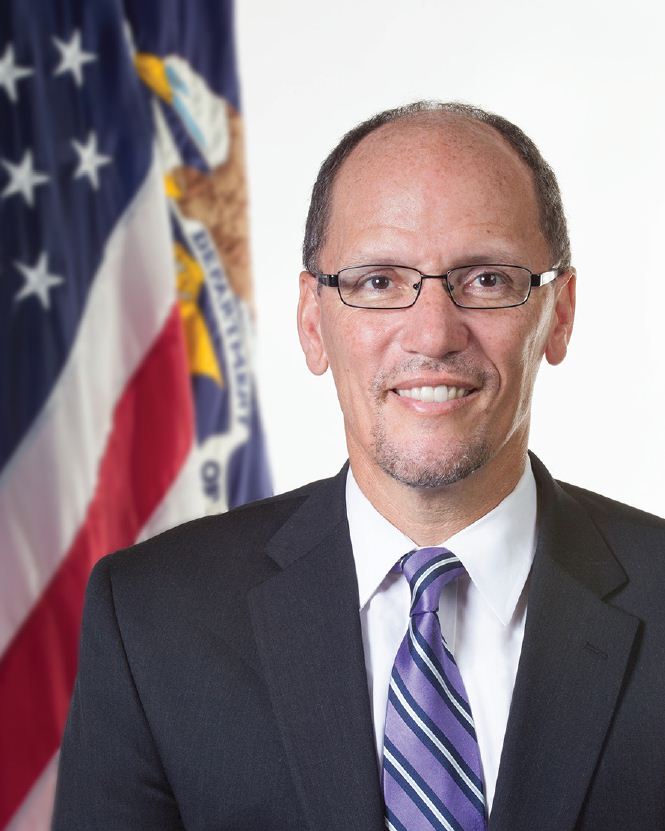Perez wins DNC chair: Savior or final nail?
Photo via Google under Creative Commons license
Secretary of Labor Thomas Perez won the Democratic National Committee (DNC) chairmanship election Feb. 25.
Secretary of Labor Thomas Perez won the Democratic National Committee (DNC) chairmanship election Feb. 25 after two rounds of voting, his second round contender being Minnesota Representative and Deputy Chair of the DNC, Keith Ellison. Without a Democratic president, it was the first time since 1985 that the DNC held a contested election for the chair, whose job it is to lead the Democratic Party is both realms of policies and politics.
The need for a new chairman came after the DNC email leak on July 22, 2016, where thousands of emails between party officials showed collusion to assist Hillary Clinton’s campaign during the Democratic primaries, contrary to what both the DNC and the Clinton campaigns previously stated.
The Chairwoman at the time, Florida Representative Debbie Wasserman Schultz, reluctantly resigned from the position after the public opinion was overwhelmingly against her in the wake of the emails; Wasserman Schultz’s temporary replacement until the election, Donna Brazile, was also exposed in assisting Clinton by emailing her questions she was going to be asked before a primary debate in March.
With exposure after exposure of the Democratic Party’s undemocratic internal favoritism during the primary, they doubled down in support of Clinton and launched a series of political attacks against the then supposed– and now confirmed– hackers and leakers of the emails: Russia and WikiLeaks.
Intending to have their cake and eat it too, they invoked Cold War Era fear-mongering and self-victimization for being the victim of the hack, instead of taking responsibility for the emails or an even more radical idea, not gaming the primary in the first place.
Although Perez won narrowly by 235-200 delegates, it tells a larger story about the state of the current Democratic Party’s struggle to regroup and rethink the essence of their message, not just out of numerous scandals, or losing the Rust Belt in the electoral college, but losing the 2016 election overall. Republicans now hold a majority in both the Senate and the House, the Executive Branch, the Supreme Court, 31 governorships, and 32 state legislatures.
Moreover, the new administration earlier this month ordered for the resignation of 46 Obama-appointed U.S. Attorneys– essentially scrubbing clean the Justice Department of dissenters. To call the results from November and their actions since anything but a bloodbath, and more importantly, a wake up call, for the Democrats is disingenuous.
What makes Perez so promising for a better Democratic Party moving forward? The answer can be found in an organization that the Democrats usually detest and antagonize, Fox News.
Fox News released a bipartisan poll earlier this March, asking questions to a randomized selection (all notable variables were held within the margin of error, so no group is overrepresented) of registered voters. The poll found that Vermont Senator Bernie Sanders held an overall favorability of 60 percent– the most favorable politician in the United States by a landslide. Trailing behind Sander’s net favorability of +29 percent is Massachusetts Senator Elizabeth Warren and Vice President Mike Pence, with net favorability of +8 percent and +4 percent, respectively.
Perez, as Secretary of Labor, was Left of the Democratic party pre-2016 election. He was the “muscle” behind the 75 months of private sector job growth, totalling in 14 million jobs. The unemployment rate down to 4.8 percent, when it was at 10 percent in 2009, gradually halving it over the last eight years. Alongside his handling of the job market is his similarities with Sander’s focus of a grassroots organization and small funding by many people, as well as reforming campaign financing laws, fighting voter ID laws, and gerrymandering borders in favor of either side.
The underlying theme behind this shift is if the Democrats can not beat the Republican populism of Donald Trump during his campaign, or barely beat out the Independent populism of previously unknown Bernie Sanders in the primary, then they need to join in on the populist fervor in the United States.
However, Keith Ellison was unanimously re-elected his former position of Deputy Chair, whose job it is to gather the Party members to cooperate and support one set of policies or one plan of action. Ellison was thoroughly a Clinton-loyalist, meaning that although the “soul-searching” within the Democratic Party appears to be waning after Perez’s election, there may still remain some growing pains.







